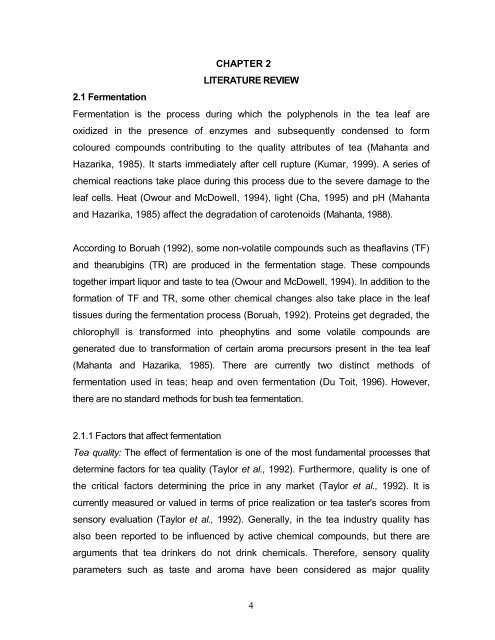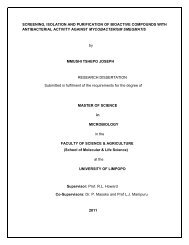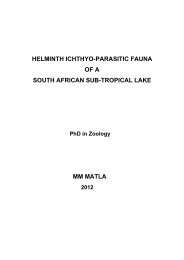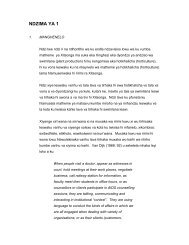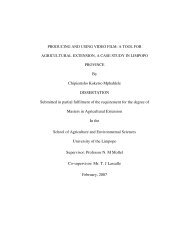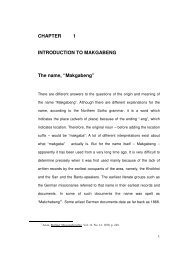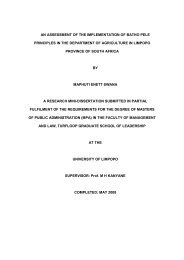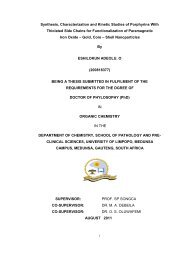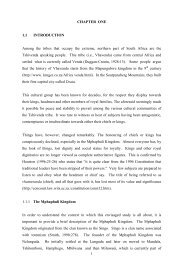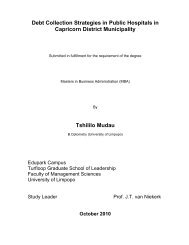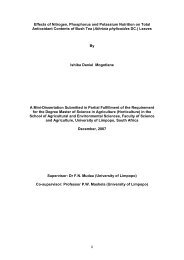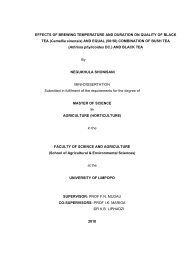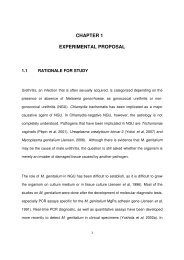Hlahla LN Mini-Dissertation.pdf - University of Limpopo Institutional ...
Hlahla LN Mini-Dissertation.pdf - University of Limpopo Institutional ...
Hlahla LN Mini-Dissertation.pdf - University of Limpopo Institutional ...
Create successful ePaper yourself
Turn your PDF publications into a flip-book with our unique Google optimized e-Paper software.
2.1 Fermentation<br />
CHAPTER 2<br />
LITERATURE REVIEW<br />
Fermentation is the process during which the polyphenols in the tea leaf are<br />
oxidized in the presence <strong>of</strong> enzymes and subsequently condensed to form<br />
coloured compounds contributing to the quality attributes <strong>of</strong> tea (Mahanta and<br />
Hazarika, 1985). It starts immediately after cell rupture (Kumar, 1999). A series <strong>of</strong><br />
chemical reactions take place during this process due to the severe damage to the<br />
leaf cells. Heat (Owour and McDowell, 1994), light (Cha, 1995) and pH (Mahanta<br />
and Hazarika, 1985) affect the degradation <strong>of</strong> carotenoids (Mahanta, 1988).<br />
According to Boruah (1992), some non-volatile compounds such as theaflavins (TF)<br />
and thearubigins (TR) are produced in the fermentation stage. These compounds<br />
together impart liquor and taste to tea (Owour and McDowell, 1994). In addition to the<br />
formation <strong>of</strong> TF and TR, some other chemical changes also take place in the leaf<br />
tissues during the fermentation process (Boruah, 1992). Proteins get degraded, the<br />
chlorophyll is transformed into pheophytins and some volatile compounds are<br />
generated due to transformation <strong>of</strong> certain aroma precursors present in the tea leaf<br />
(Mahanta and Hazarika, 1985). There are currently two distinct methods <strong>of</strong><br />
fermentation used in teas; heap and oven fermentation (Du Toit, 1996). However,<br />
there are no standard methods for bush tea fermentation.<br />
2.1.1 Factors that affect fermentation<br />
Tea quality: The effect <strong>of</strong> fermentation is one <strong>of</strong> the most fundamental processes that<br />
determine factors for tea quality (Taylor et al., 1992). Furthermore, quality is one <strong>of</strong><br />
the critical factors determining the price in any market (Taylor et al., 1992). It is<br />
currently measured or valued in terms <strong>of</strong> price realization or tea taster's scores from<br />
sensory evaluation (Taylor et al., 1992). Generally, in the tea industry quality has<br />
also been reported to be influenced by active chemical compounds, but there are<br />
arguments that tea drinkers do not drink chemicals. Therefore, sensory quality<br />
parameters such as taste and aroma have been considered as major quality<br />
4


